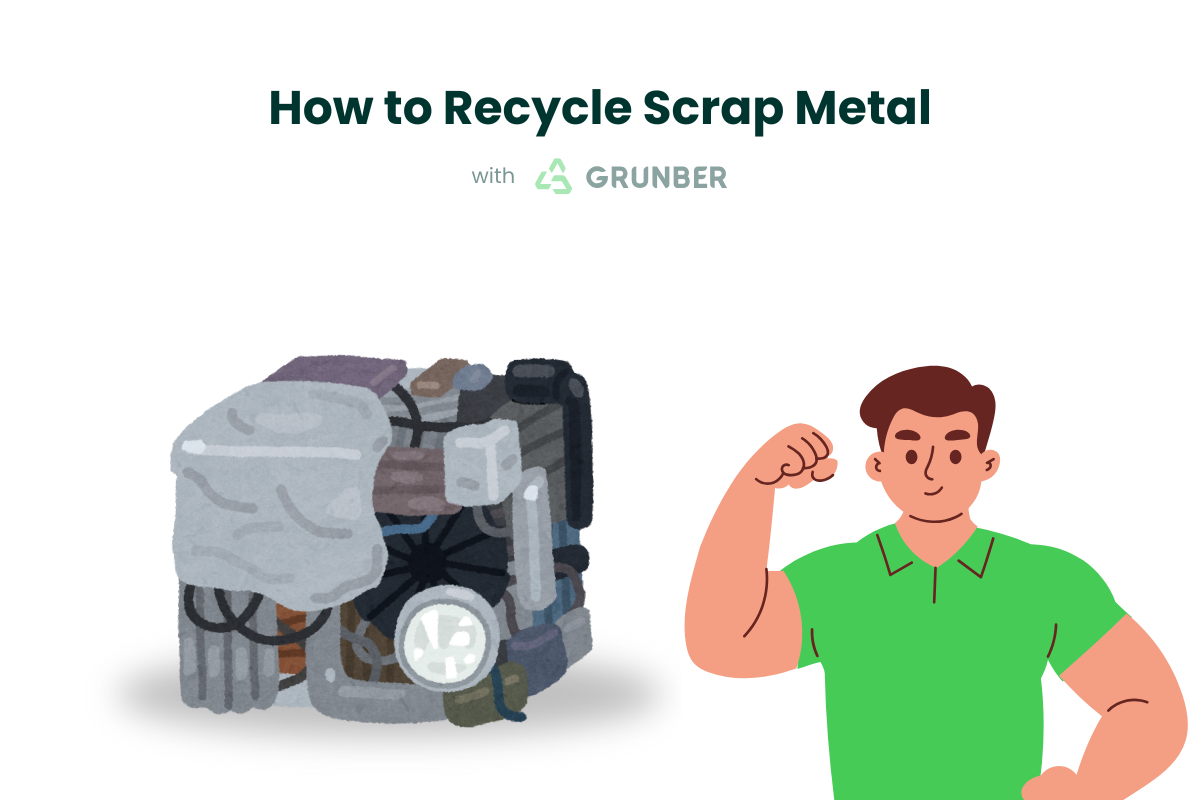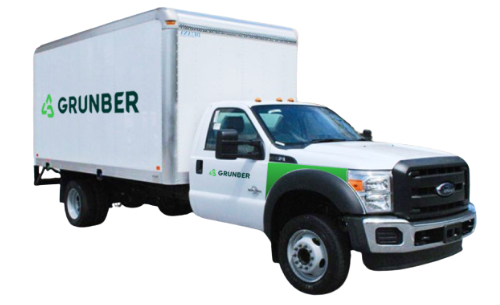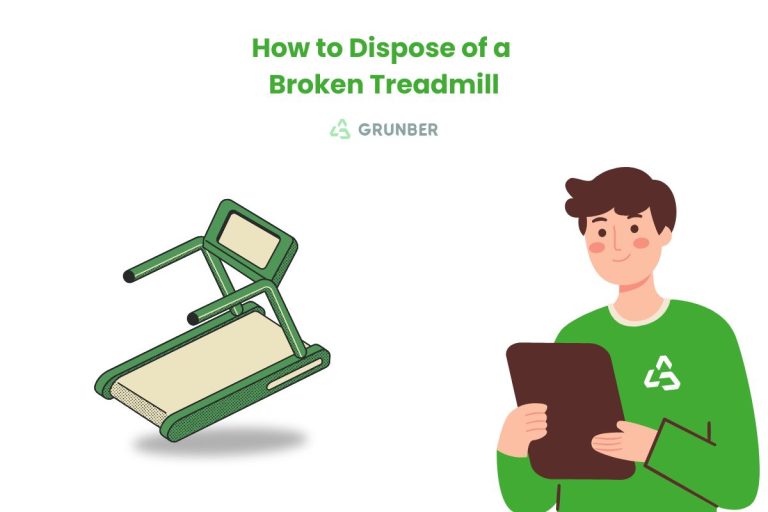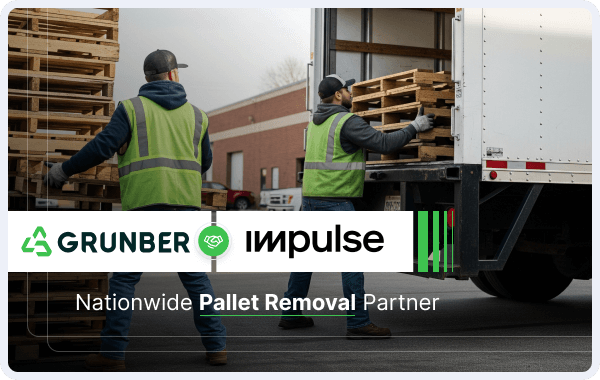Do you have old metal items gathering dust in your garage, shed, or business property? From broken appliances to leftover construction materials, scrap metal is a common form of clutter. Often, individuals and businesses aren’t sure what to do with it, and it might end up in the regular trash simply due to a lack of awareness about available resources.
But here’s a crucial point: most scrap metals are recyclable. Recycling scrap metal isn’t just good for the environment; it’s also a valuable practice that conserves resources and can even offer financial benefits.
At Grunber, we believe that clearing out clutter can and should be both convenient and environmentally responsible. Our mission is to make junk removal effortless and responsible for everyone. Scrap metal recycling is a key part of our commitment to being eco-conscious, and we even got our start collecting scrap metal in Boston, MA.
This guide will walk you through the basics of scrap metal recycling and explain how Grunber can help you handle your metal waste in a fast, hassle-free, and responsible way.
What is Scrap Metal?
Put simply, scrap metal is any old, surplus, or waste metal. It can come from various sources, such as old appliances, furniture, construction sites, or even packaging materials.
Scrap metal is primarily categorized into two types:
- Ferrous Metals: These metals contain iron. They are magnetic. Common examples include steel and iron, often found in cars, chairs, shelves, cabinets, and construction materials. While abundant and highly recycled, they generally fetch lower prices at scrap yards compared to non-ferrous metals.
- Non-Ferrous Metals: These metals do not contain iron. They are not magnetic. Non-ferrous metals are particularly valuable because they can be recycled repeatedly without losing their chemical properties. Examples include copper, aluminum, brass, bronze, tin, gold, silver, and zinc. Non-ferrous metals are typically worth more than ferrous metals. Copper, in particular, is one of the most valuable metals to recycle, found in plumbing, roofing, air conditioners, and electrical wires.
The easiest way to differentiate between ferrous and non-ferrous metal is with a magnet. If it sticks, it’s ferrous. If it doesn’t stick, it’s non-ferrous.
It’s important to know that not all metal items can be recycled easily or through standard methods. Items that are generally not recyclable through typical scrap metal channels include paint cans with paint traces, items containing mercury, motor oil cans, pots and pans, propane gas tanks, and radioactive metals. Electronic waste (e-waste) and appliances often contain metal but require specialized recycling processes.
Why Recycle Scrap Metal?
Recycling scrap metal offers significant benefits, both for the planet and, potentially, for your pocket.
Here are some key reasons why recycling metal is a practice we should all embrace:
- Environmental Conservation: Recycling metal reduces the need for mining new ore. Mining is a resource-intensive process that can cause significant environmental disruption. By reusing existing metal, we conserve natural resources and minimize habitat destruction.
- Energy Savings: Producing metals from raw materials requires a lot of energy. Recycling metal uses significantly less energy than extracting and processing virgin materials. For example, using recycled steel can reduce air pollution by nearly 90%.
- Reducing Landfill Waste: Metal is a durable material that takes a very long time to degrade. Keeping scrap metal out of landfills saves valuable space and prevents potential soil and groundwater contamination from any residual chemicals or rust.
- Economic Benefits: The scrap metal recycling industry supports jobs and economic activity. Furthermore, valuable non-ferrous metals can be sold to scrap yards, providing a financial return. While the amount varies based on metal type and weight, you can make money from your scrap.
- Sustainable Material Loop: Recycling allows metal to be re-purposed and reused in various industries, such as construction, transportation, and manufacturing. Metal can often be recycled repeatedly without losing quality, creating a sustainable material loop.
Recycling metal is truly a “no-brainer” when you consider the environmental, energy, and potential financial advantages.
How to Prepare Scrap Metal for Recycling
To ensure your metal can be recycled effectively and to maximize its value if you take it to a scrap yard, a little preparation goes a long way.
Here are the basic steps:
- Collect & Identify: Gather all the metal items you wish to recycle. As you collect, start identifying what is metal and what isn’t. A general rule is that an item should be at least 50% metal to be considered scrap metal for recycling. Use your magnet to distinguish between ferrous (magnetic) and non-ferrous (non-magnetic) metals. Knowing the types of metal will help you understand their potential value.
- Sort by Type: Separate your collected metal into different piles or containers based on their type (e.g., aluminum in one bin, copper in another, steel in a third). Keeping different metals separate ensures higher value, especially for non-ferrous metals.
- Remove Contaminants: Clean the metal by removing any non-metallic attachments or contaminants. This includes plastic coatings, rubber, wood, dirt, grease, or oil. For example, removing the plastic insulation from copper wires significantly increases their value. Hazardous materials like lead should be cleaned and treated, often requiring a specialist facility.
- Prepare for Handling: Large metal items, like appliances, may need to be cut or broken down into more manageable pieces. This step helps make transportation and processing easier.
Following these steps makes the subsequent recycling process more efficient and effective.
The Scrap Metal Recycling Process at a Facility
Once collected and prepared, scrap metal heads to a recycling facility or scrap yard. Here’s a general overview of what happens next:
- Sorting: The metal is sorted again, typically by type and grade, to ensure purity for melting.
- Shredding/Compacting: Large pieces are shredded or compacted into smaller, more manageable sizes. This increases the surface-to-volume ratio, making the melting process more energy-efficient.
- Melting: The sorted and shredded metal is melted down in large furnaces. Different metals require different furnaces and temperatures.
- Purification: Impurities are removed from the molten metal. This can involve chemical or electrical processes (like electrolysis) to ensure the final product is pure and high-quality.
- Solidifying: The purified molten metal is cooled and solidified. It’s often formed into standardized shapes like ingots, sheets, or bars, ready to be shipped to manufacturers.
- Redistribution: The recycled metal is then transported to various industries to be used in the creation of new products.
This multi-step process ensures that scrap metal is transformed back into usable material, ready for a new life.
Maximizing Value and Getting Started
If you’re recycling metal yourself, knowing the current market prices is helpful to ensure you get a fair payment from a scrap yard. Prices for different metals fluctuate based on market demand. Non-ferrous metals, especially copper, aluminum, and brass, generally command higher prices than ferrous metals like steel and iron.
While you can transport scrap metal to a local scrap yard yourself, dealing with large or heavy quantities, sorting, and understanding scrap yard procedures can be time-consuming and intimidating for many. This is where a professional junk removal service like Grunber comes in.
How Grunber Makes Scrap Metal Recycling Easy and Responsible
Grunber simplifies the entire process of getting rid of your scrap metal. We are not just a junk removal service; we are a platform built on connecting you with local drivers who share our passion for speed, transparency, and community impact. Our commitment to being eco-conscious is fundamental to our operations.
Here’s how we help with your scrap metal:
- Convenient Pickup: Instead of hauling heavy metal yourself, we come to you. Just schedule a pickup, and our trusted local drivers will handle the heavy lifting.
- Eco-Conscious Handling: Recycling is a core part of our environmental commitment. Whenever possible, we recycle materials like scrap metal to reduce the impact on landfills. Our process ensures that your metal is directed to the proper channels for recycling.
- Hassle-Free Experience: Our platform streamlines scheduling and support, making the process simple and straightforward. We aim for a stress-free experience every time.
Whether you have a single metal item or a significant amount of scrap from a cleanout or project, Grunber is here to help. We make it easy for you to contribute to a more sustainable future by handling your metal waste responsibly.
Get Started Today!
Recycling scrap metal is a powerful way to conserve resources, save energy, and protect the environment. While you can do it yourself, working with a service like Grunber makes the process incredibly easy and guarantees that your metal is handled with environmental responsibility in mind.
Don’t let that old metal become landfill waste. Partner with Grunber for a fast, eco-friendly solution to your scrap metal removal needs.
Ready to clear out your scrap metal the eco-conscious way? Request a Quote Here.











